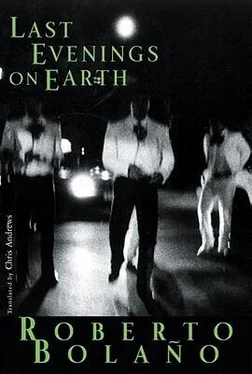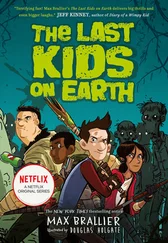He makes no more telephone calls.
Beside the village there is a wood. At some point during the night U leaves the path and enters the wood. The next day a farmer finds him: he has hanged himself from a tree with his own belt, not as simple a task as it might seem at first. The gendarmes find U's passport and his other papers, his driver's licence and social security card, scattered far from the corpse, as if U had thrown them away as he walked through the wood or tried to hide them.
VAGABOND IN FRANCE AND BELGIUM
B has crossed the border into France. In five months of wandering he will spend all the money he has. Ritual sacrifice, gratuitous act, boredom. Sometimes he takes notes, but as a rule he limits himself to reading. What does he read? Detective novels in French, a language he hardly understands, which makes the novels more interesting. Even so, before the last page he always guesses who the murderer is. France is not as dangerous as Spain and B needs to feel that he is in a low-danger zone. B has crossed the border with money to spend because he has received an advance from his publisher, and after putting 60 percent of the sum in his son's bank account he has gone to France because he likes France. Simple as that. He took the train from Barcelona to Perpignan, spent half an hour walking around the Perpignan station, until he felt he had understood what there was to understand; he ate in a restaurant in the city, saw an English movie, and then, as night was falling, took another train, direct to Paris.
In Paris, B stays in a little hotel in the rue Saint-Jacques. The first day he visits the Luxembourg Gardens, sits on a park bench and reads, then goes back to the rue Saint-Jacques, finds a cheap restaurant, and eats there.
The second day, after finishing a novel in which the killer lives in an old people's home (which resembles the world beyond Lewis Carroll's looking glass), he sets off in search of secondhand bookshops and finds one in the rue du Vieux Colombier, where he discovers an old copy of the magazine Luna Park, number 2, a special issue on writing and graphics, with texts or drawings (the texts are drawings and vice versa) by Roberto Altmann, Frederic Baal, Roland Bardies, Jacques Calonne, Carlfriedrich Claus, Mirtha Dermisache, Christian Dotremont, Pierre Guyotat, Brion Gysin, Henri Lefebvre, and Sophie Podolski.
The magazine, edited by Marc Dachy, which comes out or used to come out three times a year, was published in Brussels, by transйdition, and has or had its registered office at number 59, rue Henry van Zuylen. At one time Roberto Altmann was a famous artist. Who remembers Roberto Altmann now? wonders B. The same goes for Carlfriedrich Claus. Pierre Guyotat was a notable author. But there is a difference between notable and memorable. In fact, B once thought he wanted to be like Guyotat, in days gone by, when as a young man he was reading Guyotat's work. That bald, massive individual, Pierre Guyotat, ready to take on all comers and eat them alive in the darkness of an attic room. He doesn't know who Mirtha Dermisache was, but her name rings a bell: possibly a beautiful woman, and almost certainly elegant. Sophie Podolski was a poet whom he and his friend L admired (adored even) back in Mexico, when they were little more than twenty years old. Roland Barthes, well, everyone knows who he is. B has seen Dotre-mont's name somewhere else, perhaps he once read some of his poems in a forgotten anthology. Brion Gysin was a friend of Burroughs, the one who gave him the idea for his cut-ups. And that leaves Henri Lefebvre. The name means nothing to B. And suddenly, in the secondhand bookshop, that name, the only one that means nothing to B, lights up like a match struck in a dark room. Or that is how it feels to B. He would have preferred it to light up like a lamp. And in a cave rather than a dark room, but the fact is that Lefebvre, the name Lefebvre, flares briefly like a match.
So B buys the magazine and loses himself in the streets of Paris, where he has gone precisely to lose himself, to watch the days slip away, and although he'd been imagining the lost days as sunny, as he walks along with the issue of Luna Park in a plastic bag dangling lazily from his hand, that sunny image is cast into shade, as if the old magazine (which is beautifully produced, by the way, and in almost perfect condition in spite of the years and the dust that builds up in secondhand bookshops) had triggered or provoked an eclipse. The eclipse, as B knows, is Henri Lefebvre. It is Henri Lefebvre's relationship with literature. Or, more precisely: his relationship with writing.
After walking aimlessly for many hours, B arrives at his hotel. He feels well. He is relaxed and feels like reading. Earlier, on a bench in the square Louis XVI, he tried to decipher Lefebvre's graphic script. A difficult undertaking. Lefebvre draws his words as if the letters were blades of grass. The words seem to be shifting in the wind, an easterly wind; a field, grass of uneven height, a cone unravelling. As he watches the words (because the first thing he has to do is watch them) B remembers — as if he were seeing it all on a movie screen — faraway fields in the southern hemisphere where his adolescent self is searching desultorily for a four-leaf clover. Then it occurs to him that this memory may actually come from a film and not from real life. The real life of Henri Lefebvre, it seems, was touchingly simple: he was born in Masnuy Saint-Jean in 1925. He died in Brussels in 1973. In other words he died in the year of the military coup in Chile. B tries to remember the year 1973. It is no use. He has walked too far and although he feels relaxed, in fact he is tired and what he needs is food or sleep. But B can't sleep so he goes out to eat. He gets dressed (he is naked though he can't remember taking off his clothes), combs his hair, and goes down to the street. He eats in a restaurant in the rue des Ecoles.
At the next table is a woman who is also eating on her own. They smile at each other and leave the restaurant together. He invites her up to his room. The woman accepts spontaneously. They talk and B observes her as if through a curtain. Although he is listening carefully, he cannot understand much. The woman refers to unrelated events: children playing on swings in a park, an old woman knitting, moving clouds, the silence that reigns, so the physicists tell us, in outer space. A world without noises, she says, in which even death is silent. At some point, just to keep the conversation going, B asks her what she does for a living, and she replies that she is a prostitute. Ah, good, says B. But just for something to say. In fact he doesn't mind one way or the other. When the woman finally falls asleep, he looks for Luna Park, which is lying on the floor, almost under the bed. He reads that Henri Lefebvre, who was born in 1925 and died in 1973, spent his childhood and adolescence in the country. In the deep green fields of Belgium. Then his father died. His mother, Julia Nys, remarried when he was eighteen. His stepfather, a jovial fellow, used to call him Van Gogh. Not because he liked Van Gogh of course, but to make fun of his stepson. Lefebvre moved out to live on his own. But he soon came back to his mother's house and there he stayed until she died in June 1973.
Two or three days after the death of his mother, Henri's body was found beside his desk. Cause of death: a massive overdose of prescription drugs. B gets out of bed, opens the window and looks at the street. After Lefebvre's death, thirty pounds of manuscripts and drawings were discovered. "Very-few publishable texts," says the brief note on the author. In fact, the only thing that Lefebvre published in his lifetime was a critical essay entitled "Phases de la poйsie d'Andrй du Bouchet," under the pseudonym Henri Demasnuy, in Syntheses, number 190, March 1962. B imagines Lefebvre in his hometown of Masnuy Saint-Jean. He imagines him at the age of sixteen, looking at a German army truck, in which there are only two German soldiers, smoking and reading letters. Henri Demasnuy, Henri of Masnuy. When he turns around, the woman is leafing through the magazine. I have to go, she says, without looking at him, still flicking the pages. You can stay here, says B, knowing it's not likely. The woman says neither yes nor no, but after a while she stands up and starts getting dressed.
Читать дальше












